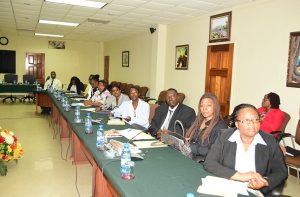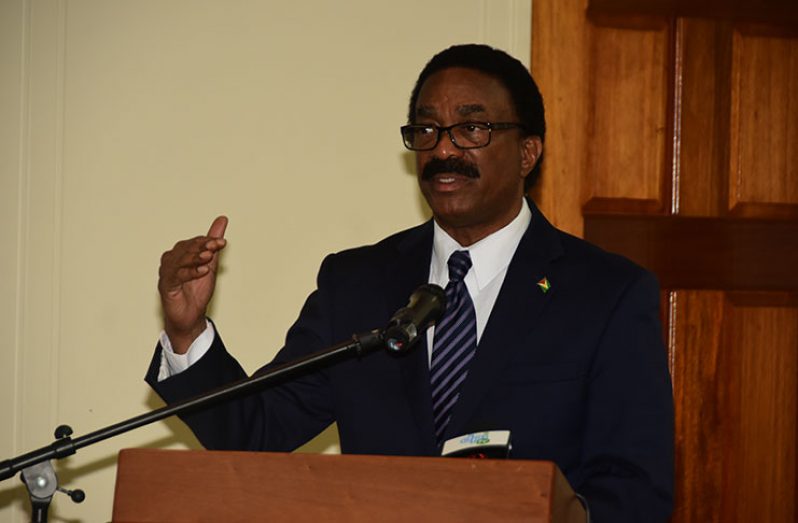…AG tells AML/CFT seminar as he warns of challenges in Fourth Round evaluation
ATTORNEY General and Legal Affairs Minister Basil Williams said supervisory bodies must up their efforts on a collaborative front to bring money launderers to justice, lest the country be left out in the cold during the 4th Round of Mutual Evaluation, as he pointed to the challenges currently faced by Trinidad and Tobago.
During its 4th Round of Mutual Evaluation, Trinidad and Tobago was placed in the “Enhanced Follow-up” category after being considered by the Financial Action Task Force (FATF) to be non-compliant or partially compliant as a result of low or moderate effectiveness.
On Friday during an Anti-Money Laundering and Countering the Financing of Terrorism (AML/CFT) National Coordination Committee Seminar at the Bank of Guyana, Minister Williams reminded representatives of supervisory agencies present, that major emphasis is placed on ‘Technical Compliance’ and ‘Effectiveness’ during the 4TH Round of Mutual Evaluation.
Williams, who is also Chairman of the Caribbean Financial Action Task Force (CFATF), said although Guyana has the requisite AML/CFT legislation in place, it has not recorded a single prosecution or conviction to date, noting that such a scenario does not augur well for the country.
“We have to tighten up, otherwise we drown in a pool,” he said frankly.
Singling out the Financial Intelligence Unit (FIU) and the Special Organised Crime Unit (SOCU), the attorney general made it clear that there is no way Guyana could graduate out of the 4th Round of Mutual Evaluation without having convictions. Failure to show signs of effectiveness, when the 4th Round of Mutual Evaluation is held in 2021, the new deadline set from the previous 2022, he further warned that such could result in FATF issuing a public statement calling on countries to adopt counter measures, which include the option to cut ties with the default country or enhanced due diligence.
FATF conducts 4TH Round of Mutual Evaluations for its members based on its 2012 Recommendations and the Methodology for Assessing Compliance with the FATF Recommendations and the Effectiveness of AML/CFT Systems (2013), which is periodically amended.

Photos by Adrian Narine
SOCU Director Sydney James said while suspected cases of money laundering and terrorist financing are referred to SOCU by the FIU, its tasks become even more difficult due to the number of challenges it faces. Cases from other agencies such as the Guyana Police Force are also referred to SOCU.
“One of the major challenges for us at SOCU has been the adequacy of staff,” James posited, while pointing out that for more than three years, its staff complement has not grown significantly.
“The major challenge we have is that most of these staff came over from the regular police service. They might be very familiar with the conduct of criminal investigations, but once there is a financial investigation that is when some of the challenges arise,” he explained. James, however, noted that a number of his investigators are participating in the two-week anti-corruption training course being facilitated by British experts, Tony Crompton and Mark Dilliway, who both have over 30 years experience in serious and organised crime, as well as fraud with the City of London Police.
Finance and its budgetary allocation remain a challenge. “It is our expectations that all the areas…staff, training and equipment are addressed if we are really to support Guyana advancing of out the 4th Round of Mutual Evaluation,” James posited.
Despite the current challenges the country faces, FIU Senior Compliance and Outreach Officer Alicia Williams said Guyana is scheduled to undergo the 4th Round of Mutual Evaluation in the fourth quarter of 2021, however, the evaluation could be brought forward.
Williams explained that once the Mutual Evaluation Report (MER) is adopted, the country will move onto the ‘Follow-up Process.’ That process entails two categories: Regular Follow-up and Enhanced Follow-up.
“If you have done exceedingly well during your Mutual Evaluation Report, you will be placed in Regular Follow-up. This is a default- monitoring mechanism for all countries and the first report to plenary after the adoption of the MER would be two and a half years, or after five plenaries,” the FIU officer explained.
However, the Enhanced Follow-up deals with members with significant deficiencies, and as such the first report to plenary would be one and a half years after adoption of the MER or three plenaries.
“Having satisfied the requirements to enter the enhanced follow-up, the country also meets the requirement for the FATF ICRG one-year observation,” she further explained. The FIU senior compliance officer said Guyana should aim to enter the regular follow-up process.
FATF Recommendations and Methodology, Requirements of the 4th Round of Mutual
Evaluation, Procedures of for the 4th Round of Mutual Evaluation, Technical Compliance and Effectiveness, Requirement to collect and maintain AML/CFT data and statistics were among areas covered during the one-day seminar. It is the hope of the Legal Affairs Ministry that supervisory agencies will utilise the information in the interest of the country.




.png)









